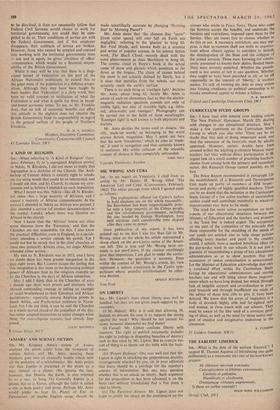ON LIBERTY SIR,—Mr. Lipton's fears about liberty may well be
justified; but they are not given much support by his examples.
(1) M. Bidault: Why is it said, that allowing M. Bidault to present his case is to support the strong against the weak? Why should he not present his views, however distasteful we find them?
(ii) Vassal!: Mr. Lipton confuses liberty with manners. The right to publish necessarily includes the right to indulge in disgusting breaches of decency such as that cited by Mr. Lipton. But to restrain this sort of thing is to throw out the baby with the bath- water.
(iii) 'Proper Defiance: One may well feel that Mr. Lipton is right in attacking the preposterous doctrine (courageously attacked by you, sir, in your editorial) that there should be a privilege for the reporter's sources of information. But one may question whether this is an attack on liberty. Such argument for the proposition as has been advanced is on the basis (not without foundation) that a free press is vital to liberty.
(iv) The Punished Airmen: Mr. Lipton does pot begin to justify his attack on 'the punishment on the
airmen who wrote to Peace News. Those who enter the Services accept the benefits, and undertake the burdens and restrictions, imposed upon them by the Service. They are (now) free to choose whether to do this or not. A necessary restriction, one may sup- pose, is that servicemen shall not write to organisa- tions whose objects appear to outsiders to include the. disintegration of the State and the collapse of the armed services. These men, knowing (or conclu- sively presumed to.know). their duties, flouted them. They were severely punished. Whether the punish- ment is too severe or not is one question. Whether they ought to have been punished at all, or let off supposedly in the interest of 'liberty,' is another matter. To talk of twisting the duty to obey orders into forcing obedience to political censorship is to invoke emotional appeal to holster a fallacy.














































 Previous page
Previous page